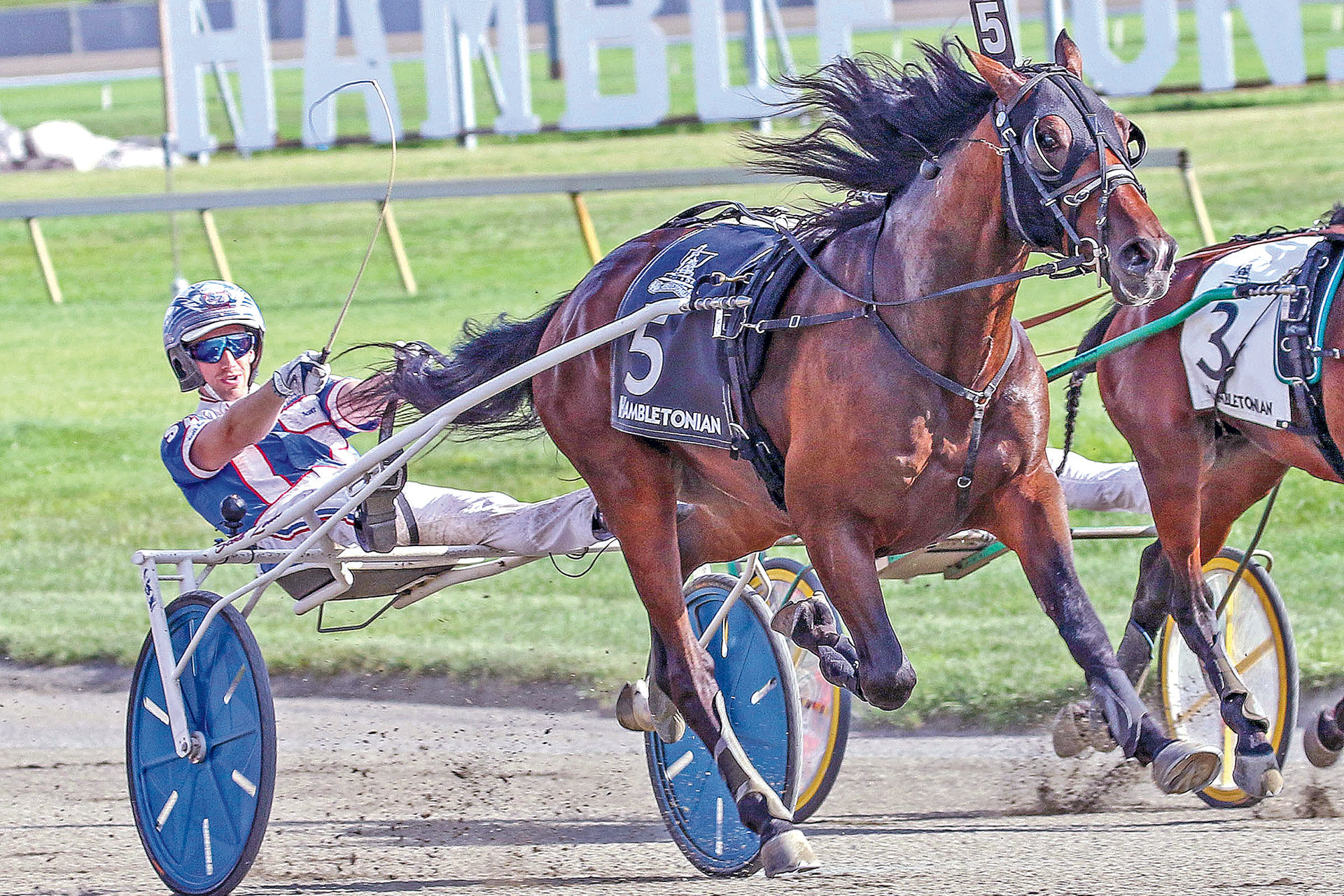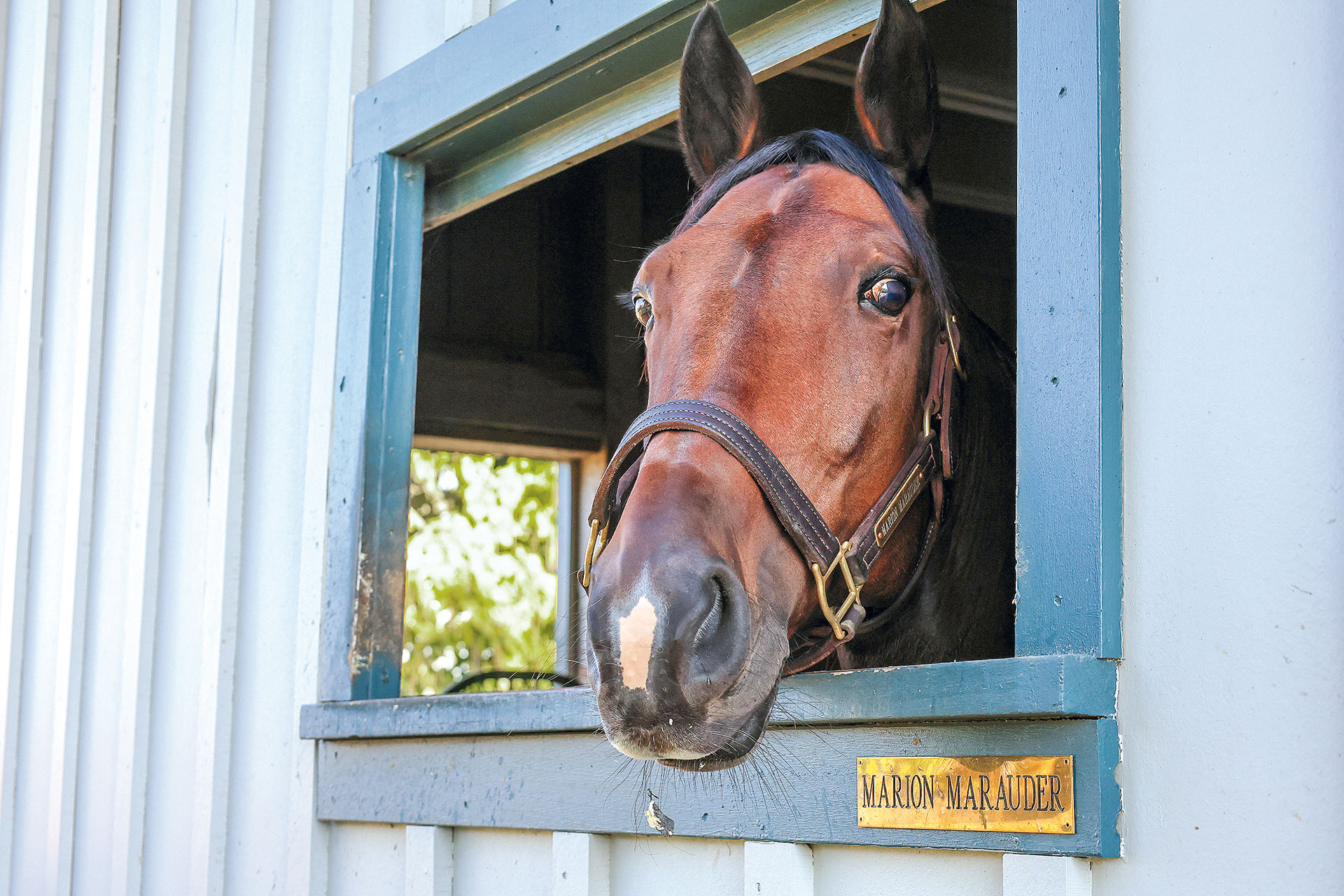Trotting Triple Crown winner Marion Marauder had a special place in the Keeling and Wellwood barn
Nine years ago, on Aug. 6, 2016, Marion Marauder’s straight-heat win in the 91st edition of the Hambletonian Stakes kicked off his sweep of the Trotting Triple Crown, making him only the ninth horse in harness racing history to win the Hambletonian, the Yonkers Trot and the Kentucky Futurity. And through his six-season career on the track, he amassed $3,392,609 in North American purses—the seventh best of all time among trotters— and became a fan favorite worthy of honor in harness racing’s Living Horse Hall of Fame, a distinction he received July 6 in Goshen, N.Y.
A son of 2009 Hambletonian champion Muscle Hill out of Spellbound Hanover, who herself won the 2000 Merrie Annabelle and Matron Stakes en route to the Harness Tracks of America’s Nova Award honor that season, Marion Marauder had the breeding befitting a champion. And for Mike Keeling—who shared training duties with his wife, Paula Wellwood—the colt also had family ties with some of his past horses.
“His mother was out of Sounds Swell, and we had a really nice horse from that same family,” explained Keeling, referring to Sooner Hanover, who won 12 races and earned $226,006 for Wellwood Stables in the early 2000s. “We saw (Marion Marauder) in the sale, we were instantly attracted to him pedigree-wise, and then we saw the individual and he suited us.
“He wasn’t perfect and he wasn’t real big, but we liked him. And then, also, he was born on our son’s birthday and little things that just kind of—it just seemed like he was coming home with us regardless.”
And thus, for $37,000, Marion Marauder left the 2014 Lexington Selected Yearling Sale under the ownership of Jean Wellwood and Devin Keeling. In his 2-year-old season, he won only one race from 13 starts—a conditioned trot at Woodbine Racetrack—but he readily displayed his potential in a pair of high-profile second-place finishes to Dan Patch and O’Brien Award winner Southwind Frank, in the William Wellwood Memorial and the Breeders Crown.
“The first time I put him in the race bike, he was just different; we knew we had a high-quality animal,” said Keeling. “He had his issues at 2; he always got off to a bad start in races because in his first qualifier he tried to bite the horse beside him, and so we always had to bring him to the gate late and not let him get into trouble behind the gate. That’s why his racing style became a closer—we didn’t know what he was going to do when he got up beside horses.
“It seemed like we were always chasing (Southwind Frank) at the end because we were always putting ourselves in a bit of a spot, but we always felt like we could contend with him.”
Lo and behold, Marion Marauder indeed turned the tables on Southwind Frank at 3. After winning four of his first five starts as a sophomore, including the Goodtimes and Stanley Dancer Memorial, Marion Marauder squared off with his old foe for the first time that season in their Hambletonian elimination, on Aug. 6, 2016, at the Meadowlands.
In his customary come-from-behind style, with Scott Zeron aboard, Marion Marauder swept three-wide off the far turn and unleashed a :27.1 sprint home to collar 1-5 favorite Southwind Frank and prevail by a half length in 1:51.3. One hour and 47 minutes later, they met again in the $1 million final, in which Marion Marauder sustained a first-over attack to grind down even-money favorite Bar Hopping before fending off a late lunge from Southwind Frank by a scant nose to ice a 1:51.4 triumph on trotting’s greatest stage.

And now, nine years later, standing in the Hambletonian winner’s circle still hasn’t lost its luster for Keeling.
“It’s just pure elation,” he said. “We all dream about it. For that to happen, it’s almost surreal, but we were so confident in his abilities. And we know that, given the right opportunity, he could do it, so it was very special.”
Two weeks later, the rivals knocked heads in the $500,000 Colonial Trot at Pocono Downs, and this time, Marion Marauder came up a half length short of Southwind Frank’s 1:52.4 winning mile over the red shale. The following week, Keeling and Wellwood pointed their stable star to the Yonkers Trot—a race that, by Keeling’s admission, wasn’t initially on their radar.
“We weren’t chasing the Triple Crown at that point; it wasn’t even something that we really thought about,” he said. “The Yonkers Trot is a tricky race and a tricky track, and we kind of felt compelled to go to it.”
Marion Marauder posted a 1:56.2 win in his elimination before coming back the following week to outlast Dan Daley’s Smalltownthrowdown by a head in 1:56.1 to take the $500,000 final of the Crown’s second jewel.
“I don’t know if he was at his 100% best,” continued Keeling. “He had to wear a Murphy blind on the inside, and Dan Daley’s horse almost got to him up the inside. He almost surprised us in that race, because Marauder had to see the horses. That horse snuck up the rail on him and kind of blew fear in us. But he got it done.”
After returning home to Ontario and a second-place finish to Bar Hopping in the Canadian Trotting Classic at Mohawk, the Keelings and Wellwoods came to the decision to supplement Marion Marauder in the Kentucky Futurity and complete their bid for the Trotting Triple Crown.
“Getting Paula and Jean (on board) and assuring them it was the right move—they were a little more concerned than I was,” Keeling said in a Standardbred Canada interview following the Canadian Trotting Classic. “Once we knew, we gave him the week off after the Trotting Classic, and he’s just coming out of his skin. I said to Paula, ‘We have to race him,’ and she said, ‘Yeah, you’re right.’”
Despite rarely staking their horses in Kentucky, Keeling felt that he and Wellwood “had to give the horse the opportunity.” So, after his connections ponied up just shy of $50,000 to supplement him, Marion Marauder found himself one of 12 horses entered for the $431,000 Futurity, which went as a single dash. Having drawn the inside starting spot in the back row, Marauder would have a logjam of traffic to negotiate in order to find racing room.
“I went to Scott (Zeron) and I said, ‘This is your problem; you’ve got to figure out how to negotiate this 12-horse field,’” Keeling recalled. “And we had three Takter horses all around us, and they weren’t going to make it easy.”
Zeron niftily floated Marion Marauder off the pegs on the first turn and latched onto a fourth-over tow as Blenheim reached the half in a soft :56.2 before fanning five-wide off the home turn and unleashing a ferocious final furlong to narrowly nab—you guessed it—Southwind Frank in a mad dash to the winning post and capture the Futurity in 1:52.3, joining Windsong’s Legacy (2004) and Glidemaster (2006) as the only horses to achieve the feat since Super Bowl swept the series in 1972.
“He loved going by horses, and he really proved it that day,” said Keeling.
After ending his 3-year-old season on a disappointing note—a 10th-place finish behind Bar Hopping and Southwind Frank in the Breeders Crown—Marion Marauder was test bred by his connections. But again, the result was a disappointing one.
“We would have liked the opportunity to stand him at stud, but he had some issues that we didn’t know until we test bred him and he was never going to be able to breed,” said Keeling. “It’s unfortunate, because, what a talent. And he had an interesting pedigree: he was three times to Valley Victory. So, that was a huge disappointment but also kind of a great opportunity. We got to race him on, and he made almost $2 million racing after his 3-year-old year. That’s pretty darn exciting to do that.”
After banking $1,484,532 in his blockbuster sophomore season, for which he was named 2016’s Dan Patch Trotter of the Year, Marion Marauder cracked a half-million dollars in both his 4- and 5-year-old seasons. At 4, he won three of 10 races, including the Hambletonian Maturity and the Graduate final, and earned $769,182 en route to divisional Dan Patch honors; the following season, he banked another $605,180 on the strength of six wins from 14 starts, including the John Cashman Memorial, Caesars Trotting Classic and Cleveland Trotting Classic. In all, Marion Marauder won 22 races from 69 starts, and he took his career mark of 1:50.2 in a July 24, 2020, overnight at the Meadowlands.

Given Marion Marauder’s success in longer races—his wins in the 2017 Hambletonian Maturity and 2018 Cashman were at 1⅛ miles, and his second-place finish to Twister B in the 2017 edition of the $1 million Yonkers International Trot was over 1¼ miles— Keeling’s lone regret was not being able to campaign his superstar overseas, where longer races are the rule rather than the exception.
“We never got to Europe,” lamented Keeling. “That’s our only regret, but COVID was happening right at the end of his career, so it’s just the way it was. . . . I truly believe that if we could have gotten the opportunity to go to Europe and race some distance races as an aged horse, I think he would have been very competitive. He just got better the further you went. He maybe maxed out in speed, but he never maxed out in ability to keep going forward.”
Following Marion Marauder’s racing career, his connections retired him to the Kentucky Horse Park’s Hall of Champions, where he became the first-ever Hambletonian winner to grace the prestigious barn. And the trotter’s induction into the Living Horse Hall of Fame rightly caps a career-defining moment for his connections.
“He’s head and shoulders above anything,” said Keeling. “We’ve had some really nice horses before him, and we’ve had a few pretty nice horses since him, but . . . he was just better.”
This story appears in the August 2025 issue of Hoof Beats, the official magazine of the USTA. To learn more, or to become a subscriber to harness racing’s premier monthly publication, click here.
